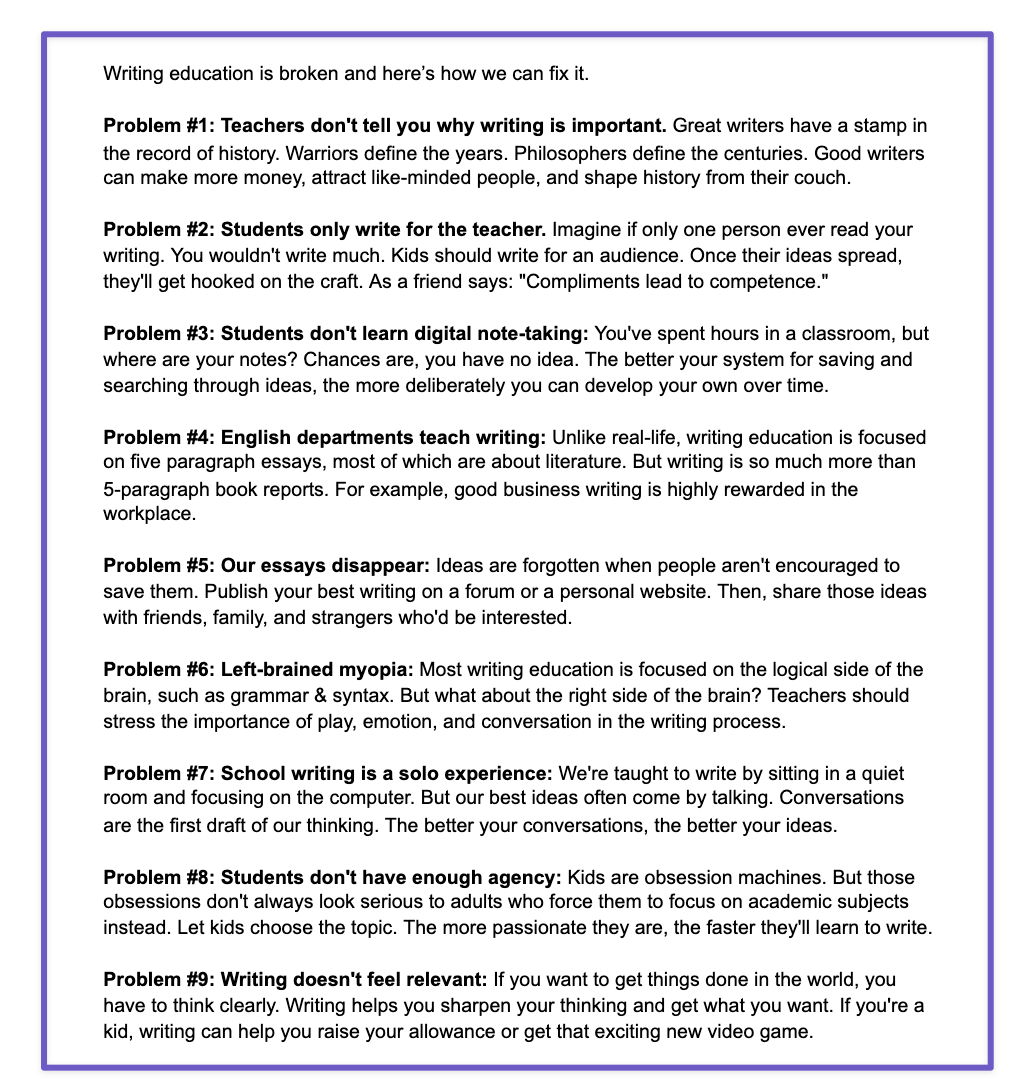
Writing education is broken.
Here's how we can improve it:
Here's how we can improve it:
Problem #1: Teachers don't tell students why writing is important.
Great writers have a stamp in the record of history. Warriors define the years. Philosophers define the centuries. Good writers can make more money, attract like-minded people, and shape history from their couch.
Great writers have a stamp in the record of history. Warriors define the years. Philosophers define the centuries. Good writers can make more money, attract like-minded people, and shape history from their couch.
Problem #2: Students only write for the teacher.
Imagine if only one person ever read your writing. You wouldn't write much. Kids should write for an audience. Once their ideas spread, they'll get hooked on the craft.
As a friend says: "Compliments lead to competence."
Imagine if only one person ever read your writing. You wouldn't write much. Kids should write for an audience. Once their ideas spread, they'll get hooked on the craft.
As a friend says: "Compliments lead to competence."
Problem #3: Students don't learn digital note-taking:
Question: You've spent hours in a classroom, but where are your notes?
Chances are, you have no idea. The better your system for saving and searching through ideas, the more deliberately you can develop your own over time.
Question: You've spent hours in a classroom, but where are your notes?
Chances are, you have no idea. The better your system for saving and searching through ideas, the more deliberately you can develop your own over time.
Problem #4: English departments teach writing:
Unlike real life, writing education is focused on five-paragraph essays, most of which are about literature. But writing is so much more than book reports.
For example, good business writing is highly rewarded in the workplace.
Unlike real life, writing education is focused on five-paragraph essays, most of which are about literature. But writing is so much more than book reports.
For example, good business writing is highly rewarded in the workplace.
Problem #5: Our essays disappear:
Ideas are forgotten when people aren't encouraged to save them. Publish your best writing on a forum or a personal website. Then, share those ideas with friends, family, and strangers who'd be interested.
Ideas are forgotten when people aren't encouraged to save them. Publish your best writing on a forum or a personal website. Then, share those ideas with friends, family, and strangers who'd be interested.
Problem #6: Left-brained myopia:
Most writing education is focused on the logical side of the brain, such as grammar & syntax.
But what about the right side of the brain? Teachers should stress the importance of play, emotion, and conversation in the writing process.
Most writing education is focused on the logical side of the brain, such as grammar & syntax.
But what about the right side of the brain? Teachers should stress the importance of play, emotion, and conversation in the writing process.
Problem #7: School writing is a solo experience:
We're taught to write by sitting in a quiet room and focusing on the computer. But our best ideas often come by talking.
Conversations are the first draft of our thinking. The better your conversations, the better your ideas.
We're taught to write by sitting in a quiet room and focusing on the computer. But our best ideas often come by talking.
Conversations are the first draft of our thinking. The better your conversations, the better your ideas.
Problem #8: Students don't have enough agency:
Kids are obsession machines. But those obsessions don't always look serious to adults who force them to focus on academic subjects instead. Let kids choose the topic. The more passionate they are, the faster they'll learn to write.
Kids are obsession machines. But those obsessions don't always look serious to adults who force them to focus on academic subjects instead. Let kids choose the topic. The more passionate they are, the faster they'll learn to write.
Problem #9: Writing doesn't feel relevant:
If you want to get things done in the world, you have to think clearly. Writing helps you sharpen your thinking and get what you want.
If you're a kid, writing can help you raise your allowance or get that exciting new video game.
If you want to get things done in the world, you have to think clearly. Writing helps you sharpen your thinking and get what you want.
If you're a kid, writing can help you raise your allowance or get that exciting new video game.
If we want kids to write, we have to de-emphasize five-paragraph book reports and show kids why writing well is so useful.
Writing makes the world come alive.
If you want to read the full thread, here's a screenshot.
Writing makes the world come alive.
If you want to read the full thread, here's a screenshot.

• • •
Missing some Tweet in this thread? You can try to
force a refresh





